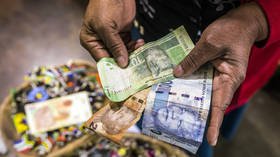‘White monopoly capital’: Anti-white South African radicals scorn massive donations that could help black businesses

White billionaires giving money to help struggling South Africans during the Covid-19 economic slump have faced a barrage of insults from anti-white radical politicians.
Leading the outcry is the Economic Freedom Fighters (EFF) parliamentary party, which went off half-cocked when it accused luxury goods tycoon Johann Rupert, South Africa’s richest man, of trying to exploit black enterprises. Rupert is the chairman of Swiss-based Richemont, which owns the Cartier, Montblanc and Dunhill brands, among others, and is the world’s second-biggest luxury goods firm after LVMH.
The EFF trumpeted with outrage that Rupert was disguising his aid package as a “loan shark” scheme which would trap black businesses in punishing debt forever. But the EFF and its firebrand leader Julius Malema had not read the small print of the aid package, as became apparent when Rupert’s Remgro company pointed out that the $53 million donation was to be used for soft loans with generous extended payback terms.
The capital would remain in the fund after the Covid-19 crisis to permanently help black businesses with cheap finance, with Rupert getting nothing out of the fund.
But despite the desperate hardship facing laid-off workers and small businesses during the shutdown, Malema demanded that they “reject it with the contempt it deserves.” In a statement, the EFF said it was “disgusted” by the “opportunism” of disguising loans as aid for the benefit of “greedy capitalists.”
EFF Statement on Exploitative Loans from Johann Rupert Disguised as Donations Towards COVID-19 pic.twitter.com/Tf9Ojo4m8X
— Economic Freedom Fighters (@EFFSouthAfrica) March 31, 2020
This comes during an ongoing job crisis in the country, with a pre-Covid unemployment rate of 29 percent.
South Africa’s other leading business dynasty, the Oppenheimers, who made their fortune out of diamonds and gold, also received flak after giving a $108 million donation to assist businesses.
The EFF deems the likes of the Ruperts and Oppenheimers the bearers of what they call ‘White Monopoly Capital’, which they blame for all of South Africa's ills, both economic and political.
The EFF is notorious for its virulent anti-white rhetoric, particularly the slogan ‘Kill the Boers’, chanted at rallies and seen as an incitement to attack farmers. It holds 44 seats out of 400 in the South African National Assembly, having almost doubled its representation at the latest election. Its members have been thrown out of parliament for fighting on several occasions.
Malema has had previous run-ins with Rupert, as well as accusing President Cyril Ramaphosa of being a white monopoly capitalist himself, and blaming white people for job losses. In February, he told a rally that they would invade and occupy Rupert and Oppenheimer wine estates and other lands.
Malema was once a leading light in the ruling party ANC and was seen as a future president. He was head of the ANC Youth League before being ousted in 2011 after embarrassing the party with his firebrand rants. But he then became a totem for populist extremists and started his socialist EFF party in 2013, with its trademark uniform of red workers’ overalls and red berets.
Some $298 million has now been donated by South Africa's billionaire elite (including the Ruperts and the Oppenheimers) into various funds that will ease suffering during the crisis. President Ramaphosa and mainstream black business and political groups have applauded the crisis donations.
The Oppenheimer family, headed by Nicholas – the grandson of founder Ernest Oppenheimer, the diamond and gold tycoon who formed De Beers and Anglo American a century ago – have set up an SA Futures Trust, which will pay weekly amounts directly into the pockets of an estimated 88,000 South African workers laid off by small and medium-sized businesses. Half of the $108 million goes into that fund, and the other half – dished out by Nicholas's sister Mary and her two daughters from their own pockets – will go to President Cyril Ramaphosa's centralized Solidarity Fund, which is more diverse in its efforts to relieve suffering and was jointly established by the public and private sectors to fight Covid-19.
South Africa's richest black mining tycoon Patrice Motsepe, who is Ramaphosa's brother-in-law, also joined in with a $54 million donation, primarily intended to help poor people and those in rural areas. Millions will be spent immediately on sanitizers, disinfectants and large amounts of water for washing.
Technology giant Naspers, jointly listed in Johannesburg and Amsterdam through subsidiary Prosus, also donated $27 million to Ramaphosa's Solidarity Fund. A separate $54 million donation will go towards buying protective equipment and medical supplies from China, where the company has links through its 30-percent holding in Tencent.
The statements, views and opinions expressed in this column are solely those of the author and do not necessarily represent those of RT.













